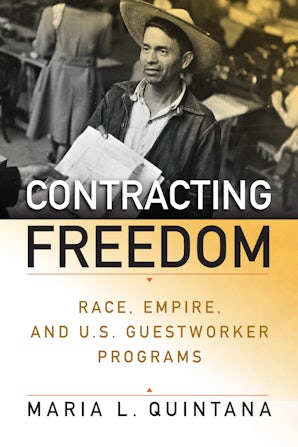
Contracting Freedom
Race, Empire, and U.S. Guestworker Programs
by Maria L. Quintana
11 b/w
Contracting Freedom is the first relational study of the origins of twentieth-century U.S. guestworker programs from Mexico and the Caribbean, focusing on their shared origins. It investigates these government-sponsored programs as the unexplored consequence of the history of enslaved labor, Japanese American incarceration, the New Deal, the long civil rights movement, and Caribbean decolonization.
In the World War II era, U.S. lawmakers and activists alike celebrated guestworker agreements with Mexico and the Caribbean as hallmarks of anti-imperialism and worker freedom. A New Deal-based conception of racial liberalism inspired many of these government officials and labor advocates to demand a turn toward state-sponsored labor contracts across the hemisphere to protect migrant workers' welfare and treatment in the postwar world. Their view of liberalism emphasized the value of formal labor contracts, bilateral agreements between nation-states, state power, and equal rights, all of which they described as advances beyond older labor arrangements forged under colonialism and slavery. Eighty years later, their conceptions of guestworker programs continue to shape political understandings of the immigration debate, as these programs are often considered a solution to offset the deportation regime, and as a response to increasingly rigid racist measures to close U.S. borders to migrants.
Maria Quintana's compelling history shifts the focus on guestworker programs to the arena of political conflict, revealing how fierce debates over the bracero program and Caribbean contract labor programs extended and legitimated U.S. racial and imperial domination into the present era. It also unearths contract workers' emerging visions of social justice that challenged this reproduction of race and empire, giving freedom new meanings that must be contemplated.